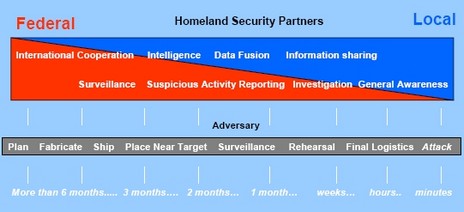RFIDs for DHS, AIS later?

“The nation’s 18 million recreational boaters may need to register their crafts in a national database and place radio frequency identification tags {RFID} on their vessels under plans put forth by a stakeholders group convened by the Homeland Security Department {DHS}.” So says an article in WashingtonTechnology. The idea, um, doesn’t sit well with the editor of Sailing Anarchy, who described it today as, “an example of what the some of the jackals at ‘Homeland Security’ think fighting the ‘war on terror’ is about…This is a pathetic joke, a national embarrassment and an outrage that this is what the Bush government is up to.”
I have a different take. Last year at the Miami Boat Show I heard a USCG Rear Admiral speak very convincingly about how dangerously “soft” and vulnerable our ports are, and how the Guard wanted all parties—including recreational boaters—to help figure out better ways to secure the waterways. His talk was a prelude to the National Small Vessel Security Summit (NSVSS), which issued a full report just recently. Here’s an IBI synopsis, and you can download the whole 122 page PDF from the NSVSS home page (it’s 2.6 Megs, not 8 as stated). The RFID story came from this report, and it relates to AIS. I know some skeptics think that DHS wants AIS so it can watch us all “big brother” style, but that didn’t seem important to the Rear Admiral, nor is it high on the report’s suggestion list:
Domain Awareness: AIS technologies should not be required for vessels under 65 feet in length until the technology is perfected, the cost of such technology significantly reduced, and until law enforcement has the ability to track and respond to all vessels in the maritime domain. Until these problems are resolved, an interim step may be for small vessels to install some type of RFID technology or install relatively inexpensive vehicle recovery and monitoring systems similar to LoJack or OnStar… Whatever tracking system is adopted it must be simple, effective, inexpensive, and multipurpose.
Of course it’s doubtful that the government will enact regulations to deal with waterway security any time soon. Heck, the USCG sent its Class B approvals up to the FCC a year ago—for collision avoidance now and maybe MDA (Marine Domain Awareness) eventually—and they’re still not approved. So what if there was a terrible act of terrorism involving the use of, say, a 25’ I/O like my Ralph? I suspect the Rear Admiral was correct when he suggested that the result might be truly Draconian regulations, like prescribed coastal routes, shoved down our throats fast. It’s a worry.
Besides understanding the Guard’s predicament, it seems like the best thing you can do now is to check out the America’s Waterway Watch program, and call 877-24WATCH if you see suspicious activity. (Yes, I realized that a curious gunk-holing photographer like me may fit the “profile”, but I’m willing to endure the hassle if it helps keep the waterways free.)

 Share
Share
Interesting that DHS uses 877-24WATCH. I just went to put this in my cellphone and there are no letters on the number keys. If I didn't have a landline phone here at my desk, I'd never get the correct numbers and yet 99% of the time the calls should come from a cellphone. FWIW, try 877-249-2824.